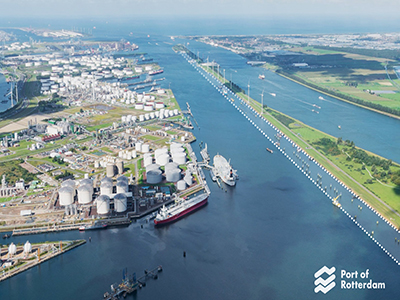The Port of Rotterdam Authority and IBM today announced their collaboration on a multi-year digitization initiative to transform the port's operational environment using Internet of Things (IoT) technologies in the cloud to benefit the port and its stakeholders.
The initiative will also prepare the Port of Rotterdam's entire site to host connected ships in the future. It begins with the development of a centralized dashboard application that will collect and process real-time water, weather sensor data and communications data, analyzed by IBM IoT technologies.
According to Paul Smits, chief financial officer of the Port of Rotterdam Authority, this will enable a new wave of safer and more efficient traffic management at the port.
 “Speed and efficiency is essential to our business, and requires us to use all of the data available to us,” he says. “Thanks to real-time information about infrastructure, water, air, etc., we can enormously improve the service we provide to everyone who uses the port, and prepare to embrace the connected, autonomous shipping of the future.”
“Speed and efficiency is essential to our business, and requires us to use all of the data available to us,” he says. “Thanks to real-time information about infrastructure, water, air, etc., we can enormously improve the service we provide to everyone who uses the port, and prepare to embrace the connected, autonomous shipping of the future.”
As the largest port in Europe, the Port of Rotterdam handles over 461 million tons of cargo and more than 140,000 vessels annually. Previously the port relied on traditional radio and radar communication between captains, pilots, terminal operators, tugboats and more to make key decision on port operations.
With the new initiative, Port of Rotterdam operators will also be able to view the operations of all the different parties at the same time, making that process more efficient. Spokesmen contend that ocean carriers and the port stand to save up to one hour in berthing time which can amount to about $80,000 in savings.
The Port of Rotterdam's digital transformation project is enabled by IBM's cloud-based IoT technologies and will see the Port of Rotterdam and IBM are working together long-term to uncover other innovative applications of IoT and artificial intelligence. Cisco and Axians are also involved in the project.

As reported here earlier, IBM and Maersk recently struck a deal to introduce blockchain technology to global shipping. Over 18 months, through initial pilots, IBM used blockchain technology to securely digitize, automate, and store critical paperwork.
“Early testing demonstrated that it can significantly reduce administrative costs, which at the time of testing could be as high as 15% of the value of the goods shipped.
SC
MR


More Ports & Shipping
- Looking back at NextGen 2024
- NextGen Supply Chain Conference set for October 21-23
- ISM reports Services economy heads up in August for third consecutive month in September
- What is the future of procurement?
- 6 Questions With … Autumn Bayles
- Estée Lauder, Schneider Electric and S&S Activewear to receive NextGen End User awards
- More Ports & Shipping
Latest Resources

 Explore
Explore
Topics
Procurement & Sourcing News
- Aggregators sitting on the throne of Africa’s e-commerce supply chains: What lessons can we learn?
- Cross-border transport 2024: Navigating the surge
- Benchmarking the complexity of ESG reporting
- Looking back at NextGen 2024
- The Corporate Sustainability Due Diligence Directive
- How to make your CFO a supply chain superfan
- More Procurement & Sourcing
Latest Procurement & Sourcing Resources

Subscribe

Supply Chain Management Review delivers the best industry content.

Editors’ Picks






